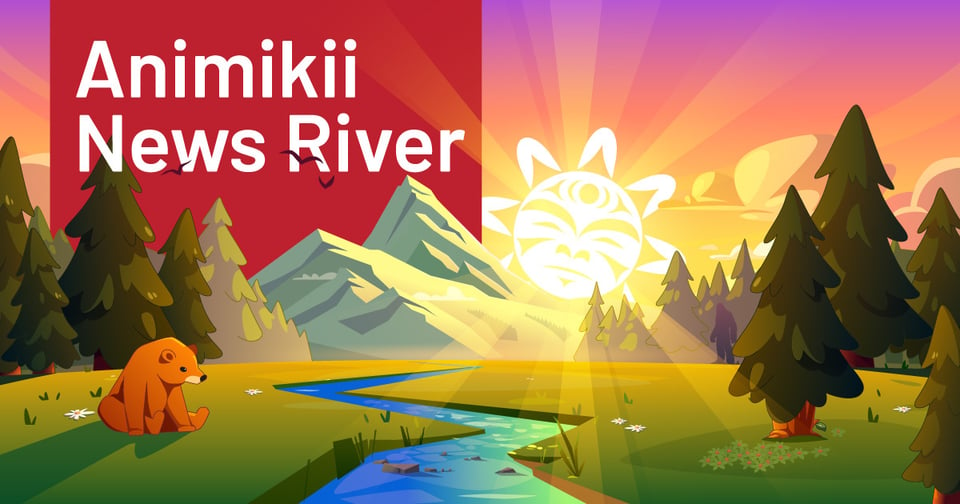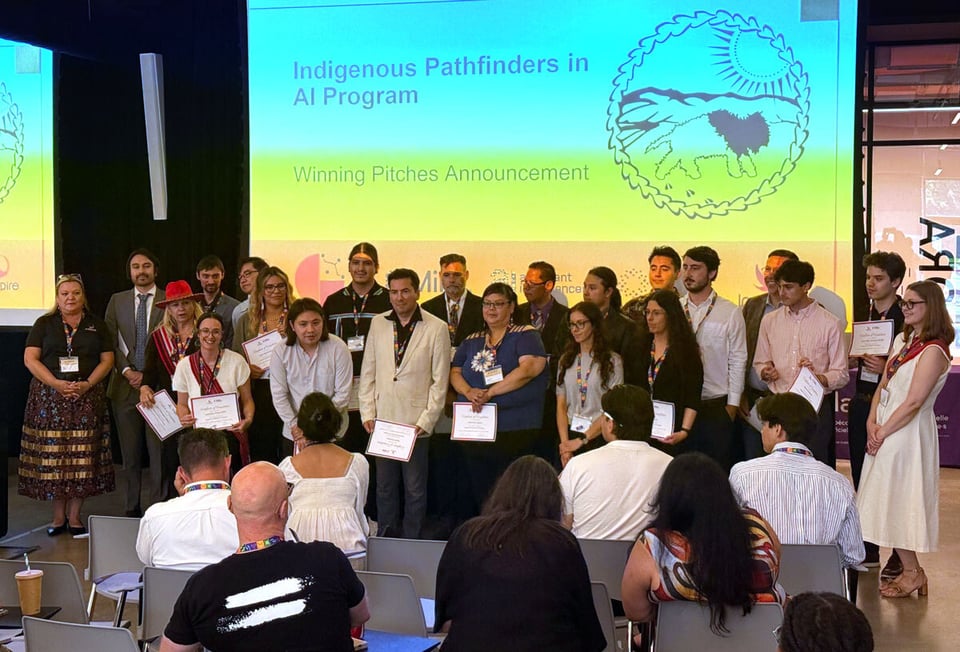Imagining Indigenous AI futures in Montreal
Tech education milestones and a winning Indigenous AI pitch!

Boozhoo News River Readers,
An exciting week in the world of Indigenous tech, celebrating World Youth Skills Day with a lesson about using AI tools for songwriting, a ground breaking program in tech and IT foundations, and the winning pitch from the second cohort of Indigenous Pathfinders in AI!
This week’s stories include:
93% completion rate marks a significant milestone in Indigenous education and technology training for students at Siksika Nation High School.
Decolonizing neuroscience: Canadian professors working with Indigenous researchers globally to advocate for and educate about Indigenous neuroethics.
Borderless roller derby team with members from 30+ distinct sovereign nations compete internationally, after several skaters felt uncomfortable skating under Team Canada/Team USA.

Mila hosts Indigenous AI Gathering 2025 in Montreal
The big picture: A two day gathering hosted by Mila - Quebec Artificial Intelligence Institute, the world’s largest academic deep learning research center - alongside Abundant Intelligences, Ivado and Indspire. Last month Mila welcomed its second cohort of Indigenous Pathfinders in AI, a group of 21 changemakers who are shaping a more inclusive tech future rooted in Indigenous knowledge. This program empowers Indigenous talent to delve into the world of artificial intelligence (AI), where participants design real-world projects that leverage AI to address meaningful, community-driven challenges. This week's gathering includes keynotes, panel conversations, and the Pathfinder Pitch competition.
Why it matters: The field of AI is advancing at an unprecedented pace, shaping the future of diverse industries and influencing global socio-economic landscapes. As this transformative technology continues to evolve, it is imperative that Indigenous voices, perspectives, knowledges and talent actively contribute to its development.
Key points:
Buffalo in Motion was selected by a panel of judges as the winning Pathfinder Pitch for their data driven and Indigenous led AI, designed to listen to the land and to buffalo through community driven research. Reading patterns in data that help inform rotational grazing, their program is committed to climate action by restoring buffalo herds, rebuilding ecosystems, revitalizing culture, and empowering nations to reclaim their land.
Winners receive $500 each, an expense paid trip to the Inspired Awards, and invitation to an Indigenous Impact Residency at MILA to advance the project.
Animikii founder Jeff Ward also offered Buffalo in Motion free hosting of data for a year on the Niiwin platform - as well as mentorship around indigenous data sovereignty from the Animikii team.
What they’re saying: “If we’re serious about climate action, why aren’t we investing in animals that already work with the land, not against it? Anything cattle can do, a buffalo can do better.” Buffalo in Motion is created by Matthew Sanspareil, Tlicho, a Computer Science student at UBC, and Rune Hartgerink, Anishinaabe, a Sociology/Archeology student at McGill.
Learn more: The full event was livestreamed and you can watch the replay of day one here, and day two here.
Curated Articles:
Students at Siksika Nation High School have made history by successfully completing the first-ever CompTIA Tech+ IT foundations training program offered at a First Nations high school in Canada. The inaugural cohort achieved an exceptional 93% completion rate, marking a significant milestone in Indigenous education and technology training. This groundbreaking program represents a collaborative effort between Siksika’s Blackfoot Tech Council, Siksika Nation High School, and CompTIA, a global leader in IT certification across various domains like cybersecurity, networking, and cloud computing. This partnership has created new pathways for Indigenous students to develop essential digital skills while remaining connected to their community and cultural values.
From AI colonialism to co-creation: bridging the global AI divide
Could a Global South country be the next AI and tech capital of the world? This was the topic of discussion at one of the ‘Big Five’ tech companies’ headquarters in London last week. I felt bombarded with one perspective after another on what could only be termed techno-determinism. With the seemingly utopian world of AI forecasted, especially for some emerging economies, one would imagine that AI is the miracle cure for all ills and that by simply harnessing AI quickly, a country could become the next global leader. While I agree that AI has the potential to solve several problems and is leading the current global revolution, a mad dash to the finish line to be the next ‘Capital’ could only lead to history repeating itself. Almost a decade ago, I argued at a conference at the Oxford Internet Institute that online social order traces a similar pattern to the historiography of class and categorisation of modern society. In short, technology is replicating colonial history. Since then, I’ve written on colonial harms in the contemporary world, including the bias in AI and how AI is tilting the power balance away from the marginalised groups. Others have also raised the crucial issues of Data Colonialism, Digital Colonialism, and Technocolonialism. But with the fast-paced grand expansion of Artificial Intelligence, increasingly, what we are encountering now could be termed as AI Colonialism.
Decolonizing neuroscience: Cross-cultural practice and reframing the field
Western traditions have long been prioritized in science, whereas Indigenous experiences, perspectives and ways of knowing have often been tokenized or sidelined. Dr. Judy Illes, UBC neurology and professor and director of Neuroethics Canada, and Dr. Melissa Perreault, Métis professor in the department of biomedical sciences at the University of Guelph and a translational neuroscientist, are working to reframe that narrative by working with Indigenous researchers globally to advocate for and educate about Indigenous neuroethics. Western and Indigenous views on brain health both encompass physical, intellectual and emotional components. However, Western approaches are reductionist — studying single components (such as a cell or molecule) in isolation, while Indigenous approaches are holistic, considering cultural, relational and spiritual dimensions of health. “I don't think we are just a blob of cells. We are cells that [can] comprise the brain and the mind and who we are, as people with agency and identity,” said Illes. “In neuroscience, we have not very much captured those components.”
Borderless teams attend Roller Derby World Cup in Austria.
Indigenous Rising Roller Derby unites the Indigenous roller derby community, representing nations from turtle island & polynesia/pasifika since 2017. They were the first borderless team to be formed. After several skaters felt uncomfortable skating under Team Canada/Team USA in the 2016 World Cup, they proceeded to compete at the highest level in roller derby, while facing a lot of challenges that most of the national teams don't have (funding, access to space to practice together, extreme distance, etc). The group is composed of skaters & staff from 30+ distinct sovereign nation states. This team was formed to unite in shared experiences as Indigenous peoples and roller derby players in a landscape where they are often forgotten, and they use their platform to show other athletes and community members what is possible for Indigenous sports across tribes, borders and nations.
Wake the Giant cultural training goes digital
Wake the Giant has launched public online access to its training platform – an immersive, self-paced course designed to deepen understanding of Indigenous culture and the impacts of colonization in Canada. “We’ve always wanted to make it available to the public, but also wanted to give it a gamified approach,” said Sean Spenrath, co-founder of Wake the Giant. Developed in partnership with Culture Foundry Studios, an educational tech company specializing in Ojibwe language learning, the course is now available to individuals, organizations, and employers nationwide through a mobile application. “We asked Culture Foundry Studios to adapt our hospital training for the public, and now we have this beautiful, gamified version available to everyone,” Spenrath said. The training was created with guidance from Elders, Knowledge Keepers, educators, and the Northern Nishnawbe Education Council, and includes content on residential schools, the Sixties Scoop, and Indigenous history.

